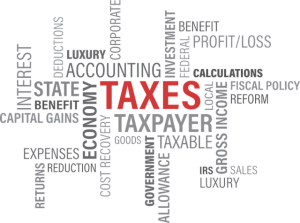


Budget 2016 – Superannuation Measures
Morrison’s Very Labor Budget
A big spending Budget, with massive tax increases, full of rosy forecasts reminiscent of Wayne Swan’s “return to surplus” in just a few years, was the disappointing outcome of tonight’s tome.
“Tax, tax, tax” was the mantra, with the few supposed reductions either virtually meaningless, or only partial recoveries of bracket-creep from the last few years.
There were no meaningful decreases in the most expensive elements of Commonwealth revenue (primarily welfare spending and transfers to the States). However, there were massive hits on self-funded retirees (and those aspiring to be so), as well as many of the lowest paid (eg. tobacco taxes at 80% per pack).
There was a meaningless decrease in the small business corporate tax rate, which most journalists interpret as a “tax cut”, even though any dividends paid out to shareholders end up being taxed at their personal marginal rates, once they are eventually distributed from the bucket companies in which they are quarantined. These subtleties are lost on uniformed journalists, most of whom have never worked a day in a small business, as well as many bureaucrats who rarely give a second thought to the private sector.
In the superannuation arena, this was not the kind of Budget we’d expect from a Coalition government. There is no doubt that superannuation concessions for those over 60 years of age and in pension phase for their superannuation have been excessively generous since Howard and Costello’s “tax-free Nirvana” amendments in 2007. However, the changes proposed tonight are equally ridiculous and would make it extremely hard for an individual to become self-sufficient in retirement using superannuation, moving forward.
A recent analysis by Rebecca Weisser indicated that, for a couple who retire on a full pension at 65 years of age, each of whom live to the average life expectancy, the social security pension alone is worth almost $660,000 (before taking into account things like the Seniors Health Care Card and subsidised travel). She calculates that this is equivalent to around $1m in superannuation, saved over a lifetime.
Tonight’s Budget – if passed (which is no guarantee) – would make it more difficult for most Australians to secure a comfortable retirement in the future.
Our main issues with tonight’s changes are not those directed towards limiting the tax concessions of high balance retirees. Income on balances up to $1.6m will still remain tax-free, but income on the excess will be taxed as per normal superannuation accumulation accounts. This, in our view, is reasonable.
Instead, we are concerned that the limits being imposed on contributing to superannuation effectively destroys the rationale for its establishment – namely, to ensure that those who don’t need to rely on a Government pension to provide for their retirement will save enough to avoid that burden being imposed on the rest of the population. The bar has been set far too low, at a $500,000 lifetime tax-free contribution limit, given that the average person retiring at 65 can expect to spend between 15 and 30 years retired. Divide $0.5m by 30 and tell us whether that looks “comfortable” to you!
At Pro-Super, we are veterans of more than 23 Budgets. We have seen many a Budget measure “proposed”, but never enacted. In the present circumstances, there is little likelihood that these changes will be legislated before the next Federal Poll is called. We hope that they will not see the light of day and that proposals designed with greater foresight, rather than simply plugging revenue gaps prior to an election, will eventually be enacted.
There is a long way to go, however at this point in time the ALP has by far the lowest taxing superannuation proposals on the table. It’s been some time (well over a decade) since that was the case.
$1.6 million Superannuation Transfer Balance Cap
From 1 July 2017, only $1.6 million of assets (per member) will be able to remain in pension phase, at any point in time. The remainder will need to be held in accumulation phase, and be subject to taxes as per normal superannuation balances (ie. 15% on income and 10% on capital gains for assets held >1yr).
Unusually, this measure will not only apply to new pensions, but will apply to existing pensions, as well.
There is very little detail on this measure and there are many variations which, depending on the eventual legislation, would affect different people in very diverse ways. This is one of those “devil-in-the-detail” measures.
A Lifetime Cap For Non-concessional Superannuation Contributions
Quite unbelievably, the Government is proposing to introduce a $500,000 lifetime cap on non-concessional contributions. To ensure maximum effectiveness the lifetime cap will take into account all non-concessional contributions made on or after 1 July 2007, from which time the Australian Taxation Office has reliable contributions records, and will commence at 7.30 pm (AEST) on 3 May 2016. Contributions made before commencement cannot result in an excess. However, excess contributions made after commencement will need to be removed or subject to penalty tax. The cap will be indexed to average weekly ordinary time earnings.
The lifetime non-concessional cap will replace the existing annual caps which allow annual non-concessional contributions of up to $180,000 per year (or $540,000 every three years for individuals aged under 65).
This is perhaps the most outrageous proposal. As indicated in our editorial above, there are many levels on which this does not sit comfortably with the traditional idea that people who are capable of saving for their retirements via superannuation should do so. It is certainly not a measure to be expected from a government from a traditionally “right” side of the spectrum.
Remove Exempt Pension Income on Transition to Retirement Pensions
The Government will improve integrity in the superannuation system by removing the tax exemption on earnings of assets supporting Transition to Retirement Income Streams from 1 July 2017 (income streams of individuals over preservation age but not retired).
[It will also remove a rule that allows individuals to treat certain superannuation income stream payments as lump sums for tax purposes.]
Catch-up Concessional Superannuation Contributions
From 1 July 2017, the Government will allow individuals to make additional concessional contributions where they have not reached their concessional contributions cap in previous years. Access to these unused cap amounts will be limited to those individuals with a superannuation balance less than $500,000.
Amounts are carried forward on a rolling basis for a period of five consecutive years, and only unused amounts accrued from 1 July 2017 can be carried forward. Annual concessional caps can limit the ability of people with interrupted work patterns — for example women or carers — to accumulate superannuation balances commensurate with those who do not take breaks from the workforce. Allowing people to carry forward their unused concessional cap provides them with the opportunity to ‘catch-up’ if they have the capacity and choose to do so.
Tax Deductions For Personal Superannuation Contributions
On the plus side, from 1 July 2017, the Government will improve flexibility and choice in superannuation by allowing all individuals up to age 75 to claim an income tax deduction for personal superannuation contributions.
This effectively allows all individuals, regardless of their employment circumstances, to make concessional superannuation contributions up to the concessional cap.
Individuals who are partially self-employed and partially wage and salary earners and individuals whose employers do not offer salary sacrifice arrangements will benefit from these changed arrangements.
Harmonising Contribution Rules For Those Aged 65 to 74
From 1 July 2017, the Government will improve the flexibility of the superannuation system by removing the current restrictions on people aged 65 to 74 from making superannuation contributions for their retirement. People under the age of 75 will no longer have to satisfy a work test and will be able to receive contributions from their spouse.
Reforming The Taxation of Concessional Superannuation Contributions
From 1 July 2017, the Government will lower the Division 293 threshold (the point at which high income earners pay addition contributions tax) from $300,000 to $250,000.
The Government will also reduce the annual cap on concessional superannuation
Contributions to $25,000 (currently $30,000 under age 50; $35,000 for ages 50 and over).
Remove The Anti-detriment Provision in Respect of Death Benefits From Superannuation
From 1 July 2017, the Government will improve the integrity and fairness of the system by removing the outdated anti-detriment provision.
The anti-detriment provision can effectively result in a refund of a member’s lifetime superannuation contributions tax payments into an estate, where the beneficiary is the dependant of the member (spouse, former spouse or child). Currently, this provision is inconsistently applied by superannuation funds.
Removing the anti-detriment provision will better align the treatment of lump sum death benefits across all superannuation funds and the treatment of bequests outside of superannuation. Lump sum death benefits to dependants remain tax free.
Reduce Spouse Tax Offset Threshold
From 1 July 2017, the Government will increase access to the low income spouse superannuation tax offset by raising the income threshold for the low income spouse to $37,000 from $10,800. The low income spouse tax offset provides up to $540 per annum for the contributing spouse and builds on the Government’s co-contribution and superannuation splitting policies to boost retirement savings, particularly of women.
Low Income Superannuation Tax Offset
From 1 July 2017, the Government will introduce a Low Income Superannuation Tax Offset (LISTO) to reduce tax on superannuation contributions for low income earners.
The LISTO will provide a non-refundable tax offset to superannuation funds, based on the tax paid on concessional contributions made on behalf of low income earners, up to a cap of $500. Provision will be made to ensure the measure can be implemented to achieve the outcomes as intended. The LISTO will apply to members with adjusted taxable income up to $37,000 that have had a concessional contribution made on their behalf.